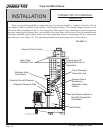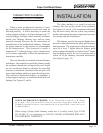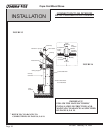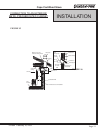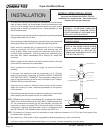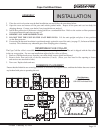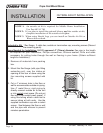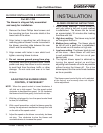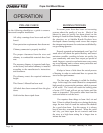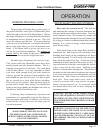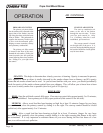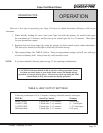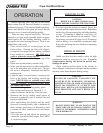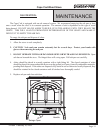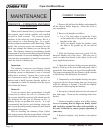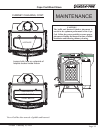
Page 26
32198A February 15, 2002 32198A February 15, 2002
Cape Cod Wood Stove
R
OPERATION
PRE-USE CHECK
Use the following checklist as a guide to ensure a
correct and complete installation:
All safety warnings have been read and fol-
lowed.
Floor protection requirements have been met.
Chimney connector is properly installed.
The proper clearances from the stove and
chimney to combustible materials have been
met.
The masonry chimney is inspected and clean,
or the factory built metal chimney is installed
according to the manufacturer’s instructions
and clearances.
The chimney meets the required minimum
height.
This Owner’s Manual has been read.
All labels have been removed from the glass
doors.
Gold trim has been wiped clean.
BURNING PROCESS
In recent years there has been an increasing
concern about the quality of our air. Much of the
blame for poor air quality has been placed on the
burning of wood for home heating. In order to improve
the situation, we at Aladdin Hearth Products have
developed cleaner burning wood stoves that surpass
the stringent requirements for emissions established by
our governing agencies.
Properly operated and maintained your Cape Cod
wood stove will obtain the peak efciency and lowest
emissions possible, resulting in better air quality for
your community and more heat output per pound of
wood. Improper operation and maintenance may cause
any wood burning unit to release more particulate and
adversely affect the environment.
It helps to know a little about the actual process
of burning in order to understand how to operate the
stove for best performance.
The rst stage of burning is called the kindling
stage. In this stage, the wood is heated to a temperature
high enough to evaporate the moisture which is present
in all wood. The wood will reach the boiling point
of water (212°F) and will not get any hotter until the
water is evaporated. This process takes heat from the
coals and tends to cool the stove.
Fire requires three things to burn: fuel, air and
heat. If heat is robbed from the stove during the drying
stage, the new load of wood has reduced the chances
for a good clean burn. For this reason, it is always
best to burn dry, seasoned rewood. When the wood
isn’t dry, you must open the air controls and burn
the stove at a high burn setting for a longer time to
initiate the burn.



